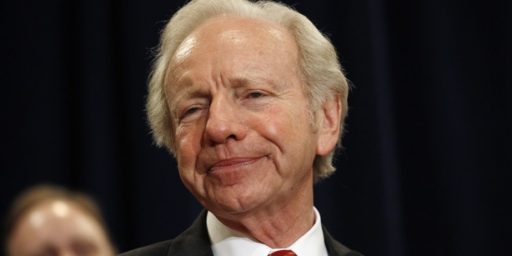Democrats Run to the Right in Key House Races
The NYT gives prominent attention to news that Democrats run relatively conservative candidates in key House seats they are trying to keep or snatch from the Republicans.
In their push to win back control of the House, Democrats have turned to conservative and moderate candidates who fit the profiles of their districts more closely than the profile of the national party.
One such candidate, Heath Shuler, was courted by Republicans to run for office in 2001. Mr. Shuler, 34, is a retired National Football League quarterback who is running in the 11th Congressional District in North Carolina. He is an evangelical Christian and holds fast to many conservative social views, like opposition to abortion rights.
“My guess is that if Democrats are in the majority, it’s going to be because of these New Democrat, Blue Dog candidates out there winning in these competitive swing districts,” Representative Ron Kind of Wisconsin, co-chairman of a caucus of centrist House Democrats, said in an interview.
But if candidates like Mr. Shuler do help the Democrats gain majority control of Congress, it could come at a political price, which may include tensions in the party between its new centrists and its more liberal political base.
While Democratic leaders have gone to great lengths to promote the views of these candidates, some, like Mr. Shuler, have views on issues like gun control and abortion that are far out of step with the prevailing views of the Democrats who control the party. On some issues, they may even be expected to side with Republicans and the Bush White House.
Democratic officials said they did not set out with the intention of finding moderates to run. Instead, as they searched for candidates with the greatest possibility of winning against Republicans, they said, they wound up with a number who reflected more moderate views. That was especially true in suburban areas and some rural districts, said Representative Rahm Emanuel of Illinois, chairman of the Democratic Congressional Campaign Committee. “As a group, they are moderate in temperament and reformers in spirit,” Mr. Emanuel said.
[…]
Collectively, the group could tilt the balance of power within the party, which has been struggling to define itself in recent elections. The candidates cover the spectrum on political issues; some are fiscally conservative and moderate or liberal on social issues, some are the reverse. They could influence negotiations with Republicans on a variety of issues, including Social Security and stem cell research.
There are two main groups of moderate Democrats in the House: the Blue Dog Coalition, a caucus of socially conservative and moderate members formed in 1994; and the New Democrat Coalition, a caucus of centrists formed in 1997. While there are differences between the two — the Blue Dogs tend to be more rural and Southern, with occasional alliances with Republicans, while the New Democrats are more suburban and wealthy and place a premium on party loyalty — there are members who belong to both. Both, of course, have a stake in helping the centrist candidates succeed.
Representative Ellen O. Tauscher of California, a co-chairwoman of the 47-member New Democrat Coalition, said that 27 of the top 40 contested House seats were being pursued by Democrats who have pledged to become members of the group, which says its chief issues are national security and fiscal responsibility. “I think there’s tremendous agreement and awareness that getting the majority and running over the left cliff is what our Republican opponents would dearly love,” Ms. Tauscher said, adding that this was something “we’ve got to fight.”
Matt Stoler is angry at the audacity of Tauscher in pointing this out, saying it amounts to declaration of intraparty war. This is essentially axiomatic. After all, in progressive states like Maine and Rhode Island, Republicans run candidates like Olympia Snowe and Lincoln Chaffee. In states and districts that are naturally aligned with the other party, the path to victory is candidates who are more centrist. That’s Politics 101.
Furthermore, if the Democrats take over the House, their leadership will come almost entirely from the Old Democrat wing. Its incumbent on the New Democrats to both fight to gain as much influence as possible and to reassure voters in Republican-leaning districts that voting for the likes of Heath Shuler is not a vote for Nancy Pelosi and Ted Kennedy.
Then again, Stoler thinks the reason Ned Lamont is losing to Joe Lieberman, despite having narrowly beaten him in the hyper-charged Democratic primary, is because the Democratic bigwigs aren’t being mean enough to Lieberman. It couldn’t be that most of the people who supported Lieberman in the primary are still support him and that Republicans and swing voters would prefer a relatively moderate candidate with seniority over a leftist freshman.





This just proves that Democrats will not only Lie, Cheat, and Steal, but also mis-represent themselves to gain the power to ruin this country and Europeanize every American.